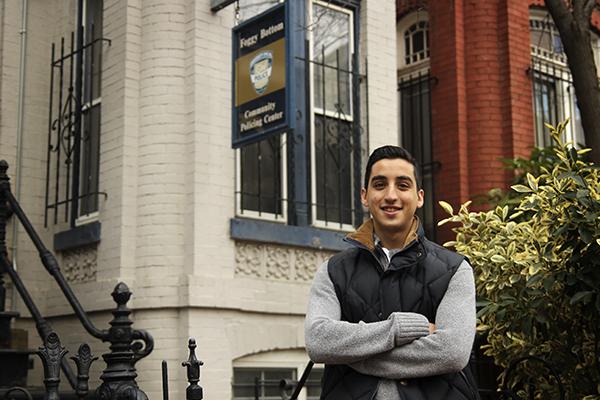A new D.C. Council bill that would allow officers in the University Police Department to patrol off campus will face the same obstacles previous proposals have faced: Student leaders and neighbors don’t want it to happen.
The bill, introduced last month, would also increase training for special police officers. Students and community members oppose the bill, citing a possible shortage of security on campus if there are fewer officers patrolling.
The Student Association Senate unanimously voted to oppose the bill at last week’s meeting. Thomas Falcigno, who is now the interim executive vice president of the Student Association and introduced the resolution last week, said there were multiple issues with allowing UPD officers to patrol off campus. For example, he noted that marijuana is legal to smoke in D.C. but banned on campus.
“My concern is that if we give a person or a body these powers, can there be an abuse of power?” Falcigno said.
He added that allowing campus police officers to patrol off campus “defeats the purpose of campus police.” He said he and other students have noticed a decrease in community service aides on campus this academic year, and that he thinks allowing UPD to patrol off campus will increase the shortage in GW’s security presence on campus.
The University changed the CSA presence in residence halls last fall to account for new crime trends and changing groups of students in residence halls, officials said. Later in the semester, GW increased security in some halls like Potomac House, leaving some students to complain about the inconvenience of having to tap their GWorld cards to enter the building, a requirement for all residence halls.
“If we’re taking our resources and placing them off campus, I question how that would potentially make campus a safer environment,” Falcigno said.
Two years ago, UPD officers were reprimanded for routinely knocking on doors at student off-campus residences and stopping people on the street who look like students. GW then proposed allowing UPD officers to be able to patrol off campus during that time. But that proposal never gained steam because officials could not get other D.C. schools on board and never ended up bringing a bill to the D.C. Council.
Falcigno said members of the SA plan to attend a D.C. Council hearing on this topic in the coming weeks to express their opposition to the bill, in addition to sending a letter to the Council.
“The point is making our voice heard,” Falcigno said.
Andie Dowd, the president of the Student Association, said she also opposes the D.C. Council bill because it could weaken GW’s security presence on campus. She said she plans on further discussing the University’s stance on off campus policing with Brackney, Senior Associate Vice President for Safety and Security Darrell Darnell and University President Steven Knapp.
“Right now I think it’s not in the students’ best interest to have this bill go forward,” Dowd said. “I think there are a lot of issues that need to be talked about.”
Dowd added that having average students involved in discussing the bill is “essential” and that she plans to get more student perspectives, particularly from students who live off campus, on the legislation.
Students and neighbors blasted GW’s proposal to expand UPD jurisdiction in 2013, citing a lack of transparency within UPD. Officials held community meetings last time the community discussed UPD patrolling off campus to build support for the idea and allow community members to share their opinion.
Marina Streznewski, the president of the Foggy Bottom Association and a long-time neighborhood resident, said the bill, which is still subject to edits as part of the legislative process, leaves many unanswered questions for the community. Streznewski said community members have shared concerns with her about whether UPD officers will have the authority to police individuals near campus but who are unaffiliated with the University.
She said there are some neighbors who see the benefits of having increased police patrols off campus. Neighbors for decades have complained about loud student parties off campus, and some neighbors see adding UPD rounds off campus helping with those issues, Streznewski said.
The bill stipulates that the Metropolitan Police Department chief would oversee the special police officers, a change Streznewski said would need to be spelled out more clearly as the bill progresses through the legislative process.
“I would think that any bill like this needs to include a way to let the public know who’s in charge where and when,” she said. “People don’t know that.”
Robin Eberhardt, Marissa Kirshenbaum and Kendrick Chang contributed reporting.







